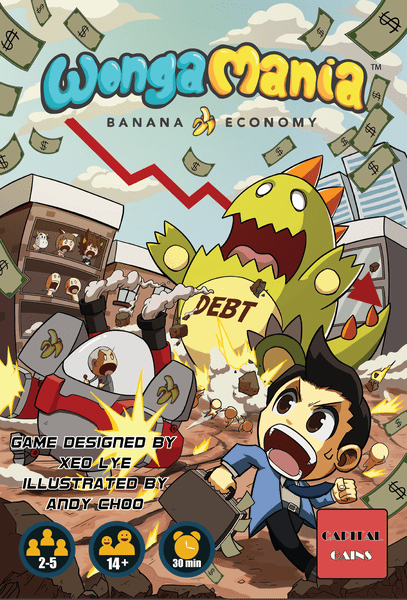Wongamania: Banana Economy (2016) Board Game
Wongamania: Banana Economy is an economic board game released in 2016 by Capital Gains Studio. Designed by Xeo Lye and illustrated by Andy Choo, Made Lidya, and Wong Chun Xi, the game allows 2-5 players to experience the highs and lows of managing their own virtual economy.
Game Components of Wongamania: Banana Economy
How To Setup Wongamania: Banana Economy
To set up the game, each player starts with a personal bank of cards and an initial amount of money. The Business Cycle board is prepared with the Debtzilla meeple, and the deck of cards is shuffled. Players draw their starting hand, and the first player is determined. At the start of each turn, the first player rolls a die to move the Debtzilla meeple around the Business Cycle board, determining the current economic phase and its effects on assets.
Gameplay Mechanics and Game Objective
Gameplay Mechanics
Game Objective
The objective is to accumulate the most points by buying and managing assets, using Trust Funds, and protecting against setbacks. The game ends when a player buys four Trust Funds, and the player with the most points wins.
Player Experience
**Wongamania: Banana Economy** offers an educational experience with a touch of competitiveness. The game is easy to pick up, making it suitable for children, yet it provides enough tactical depth for adults. However, the game can feel predictable, with the leader often being targeted by other players using Incident cards. This predictability can lead to a somewhat dry experience, despite its clever integration of economic concepts.
Pros
Cons
Personal Thoughts on Wongamania: Banana Economy
**Wongamania: Banana Economy** is a good introduction to economic concepts and investment strategies, particularly for those interested in edutainment. However, it may not be the best choice for players seeking high levels of excitement or complexity. It is ideal for families, educational settings, or for those who appreciate a straightforward, strategy-based game with a financial twist. For a more dynamic experience, players might consider other games from the same studio, such as **Cryptocurrency** or **Dirty Money**.
We are supported by our audience. When you purchase through links on our site, we may earn an affiliate commission, at no extra cost for you. Learn more.

